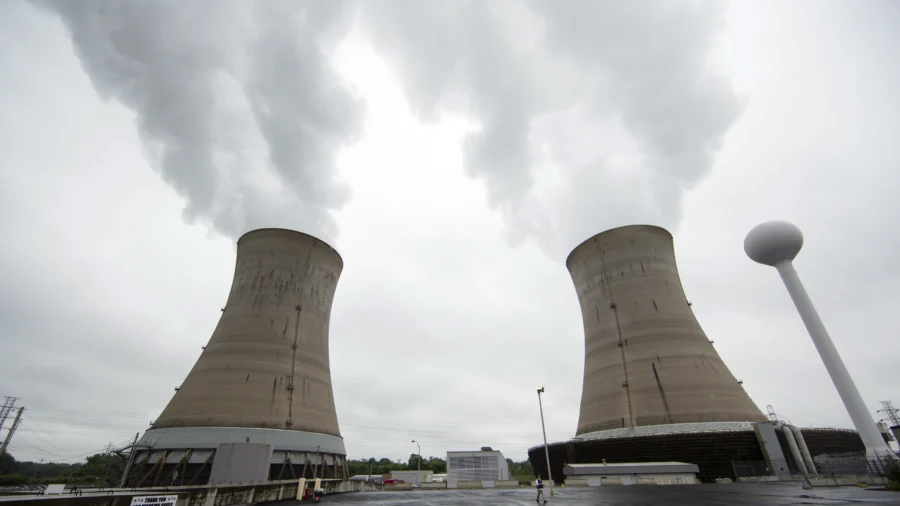The Supreme Court said on Oct. 4 that it would hear a pair of cases emanating from the federal government’s attempt to store nuclear waste in western Texas.
Texas has attempted to block this move by passing a law prohibiting the disposal or storage of high-level radioactive waste in the state.
“I will not let Texas become America’s dumping ground for deadly radioactive waste,” Texas Gov. Greg Abbott said in a press release when he asked an appeals court to intervene.
Abbott and others sued the Nuclear Regulatory Commission (NRC), which approved a plan by a company known as Interim Storage Partners to temporarily store the waste in Andrews County.
When the lawsuit reached the U.S. Court of Appeals for the Fifth Circuit, a panel of judges held that the NRC not only violated federal law by attempting to store the waste in Texas but also erred in arguing that Texas was unable to sue over its decision.
The Biden administration and Interim Storage Partners are asking the Supreme Court to reverse the Fifth Circuit’s decision, arguing that the court broke with other circuits and flouted longstanding practice on the issue.
Among other things, Texas has argued that storing the waste in the Permian Basin Region, the highest producing oil field in the United States, is dangerous for the state. The Biden administration disputed this and argued that Texas and others invalidly joined the lawsuit.
Nuclear Waste Disposal
The legal battle has been years in the making as the country struggles to figure out how to safely produce nuclear energy. Yucca Mountain in Nevada was selected by Congress as a repository for waste but disposal has faced delay after delay since the 1980s.
The Supreme Court is expected to consider how Congress authorized waste disposal—more specifically, whether the NRC could license companies to temporarily store waste absent availability at Yucca Mountain or another permanent site.
Writing for the Fifth Circuit, Judge James Ho held that two laws—the Nuclear Waste Policy Act and Atomic Energy Act—did not allow the NRC “to license a private, away-from-reactor storage facility for spent nuclear fuel.” Instead, he said Congress had set up a statutory scheme that limited temporary storage to “private at-the-reactor storage or at federal sites.”
The Biden administration disagreed. U.S. Solicitor General Elizabeth Prelogar said in her petition to the court that the Fifth Circuit’s reading of the Atomic Energy Act was “cramped.”
“The Act’s plain language therefore clearly empowers the agency to license possession of the three components of spent nuclear fuel for purposes connected to generating nuclear power—which include interim storage of spent fuel,” she said.
Texas’s Involvement
A separate question the Supreme Court decided to take on is whether Texas’s involvement in the lawsuit is legitimate under another federal law known as the Hobbs Act, or Hobbs Administrative Orders Review Act.
The law limits the parties who can ask a court for judicial review of an agency’s decision. Texas and energy company Fasken were not part of the original licensing proceeding before the agency and therefore couldn’t request the Fifth Circuit’s review, the NRC argues.
Judge Ho, however, held that the Fifth Circuit recognized an exception to the Hobbs Act’s limitations. He pointed to a footnote in the 1982 case American Trucking Associations v. Interstate Commerce Commission, which allowed “rare” instances wherein a party could appeal an agency action despite not being a party to the original agency proceeding.
Prelogar maintained that the exception used by Ho was flawed in multiple ways, ignored the plain text of the Hobbs Act, and conflicted with how other circuits have interpreted the federal law.
“The Fifth Circuit’s novel limits on the Commission’s licensing authority will have serious repercussions for the Commission and the nuclear-power industry,” she said.
“The court’s decision upends the Commission’s 44-year-old regulatory framework for licensing storage of spent fuel. And it disrupts the nuclear-power industry by categorically prohibiting the Commission from approving offsite storage of spent fuel, despite the agency’s longstanding issuance of such licenses.”
From The Epoch Times

